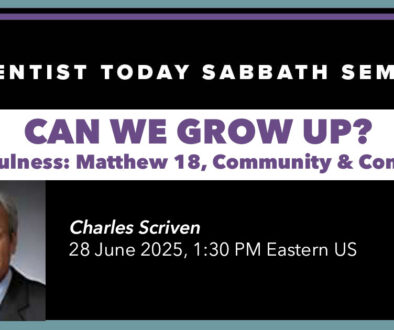Sharing Scripture for July 19 – 25
[symple_heading style=”” title=”Prayer Power: Interceding for Others” type=”h1″ font_size=”40″ text_align=”center” margin_top=”0″ margin_bottom=”30″ color=”undefined” icon_left=”” icon_right=””]
This is a tool for you to use if you lead a Sabbath School (SS) class or small group. It is keyed to the Bible texts used in the current week’s Adult SS Lesson and includes a brief story from current news you can use to introduce the discussion and then a series of discussion questions in a relational pattern designed to build fellowship and spiritual reflection.
For use: July 19 – 25
Texts: Revelation 12:7-9; Ephesians 6:12; Hebrews 7:25; Ephesians 1:15-21; Daniel 10:10-14; 1 John 5:14-16
After Rob Kochon spent 42 days hospitalized for COVID-19 at AdventHealth Orlando, he credited his recovery to the prayers of his wife, Carol. Though she couldn’t visit Rob, the hospital set up a virtual connection where she prayed for him from home. Rob went in and out of consciousness, but he still remembers snippets of those prayers. Their story is part of a larger study on the power of prayer.
Clinical psychologist Kevin Masters reports on the challenges of studying prayer scientifically. “Science is about testing observable relationships, processes and mechanisms,” Masters said. “But almost by definition, prayer, as operationalized in these studies, invokes involvement of God or a higher being, something outside the boundaries of natural phenomenon, which science cannot really study.”
What they can study, however, are the psychological benefits that come from an active prayer life. Studies on the effects of prayer found that members of a group that prayed for each other had lower rates of depression and anxiety and higher degrees of optimism compared to the no-prayer control group. [1]
Our lesson this week looks at the intercessory prayer lives of Daniel, Paul and Jesus.
How do you study the power of God when it comes to intercessory prayer? We cannot analyze God in the same way researchers can evaluate the effectiveness of an antibiotic or antidepressant. We can, however, reflect on the outcomes of prayer in our own lives and in the testimonies of others. For example, those who pray for others experience a closer relationship with God.
Intercessory prayer is also an effective part of the process of sharing our faith with others. We are involved in a supernatural struggle for the hearts and minds of people that Jesus loves and wants to save. When we pray for others, God can act on behalf of those we are lifting up. Oftentimes, those we pray for are not praying for themselves. When we pray on their behalf, God can intervene based on our prayers.
Of course, God never forces people to act against their own will. God does not violate a person’s freedom of choice. What God can do, though, is provide the influential power of the Holy Spirit to help lead a person to make the decision to desire a relationship with Jesus. When we access God’s power through the Holy Spirit, through intercessory prayer, and add our personal witness and testimony, we can be effective partners with Jesus in the mission to make friends for God.
[symple_divider style=”solid” margin_top=”20″ margin_bottom=”10″]
Connecting: Are you ever surprised when you see God answer your prayers for someone else? Why do you think it’s still surprising when it happens? How do you feel when it appears that God answers your prayer? How do you feel when it seems like God is not answering your prayers for someone else?
Sharing: Daniel 10:10-14 pulls back the curtain on the supernatural conflict as God works to answer our prayers. What is the most amazing aspect of this revelation to you?
- Satan actually has the power to interfere with God’s actions
- God actually lets Satan think he can interfere in this
- God didn’t just immediately squash the Persian prince when he resisted
- It took 21 days to overcome Satan’s opposition
- The messenger takes time to explain this event to Daniel in detail
- Other:
Applying: Make a prayer list among your group, or update and expand your current prayer list. Have everyone choose a specific time of day to pray for this list. Be sure to share any answers to these prayers when you experience them.
Valuing: Are you praying for someone close to you, but it seems that this is a hopeless case? How do you keep from getting discouraged? Connect with one other person in your group, whether by text, phone, Zoom, or another safe way you meet, and pray for each other’s loved one.
~ Chuck Burkeen




